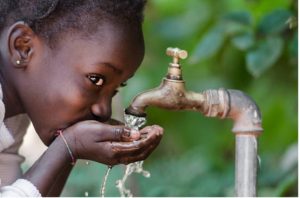SUSTAINABLE DEVELOPMENT GOAL 6:
Ensure Access to Water and Sanitation for All
Water and sanitation are essential for human survival. While substantial progress has been made in increasing access to clean drinking water and sanitation, there are still billions of people (the majority of which are in rural communities) who still do not have access to clean water and proper sanitation.

The use of contaminated drinking water and poor sanitary conditions can result in increased vulnerability to water-borne diseases like cholera, diarrhoea, typhoid, e.t.c
Poor access to improved water and sanitation in Nigeria remains a major contributing factor to high morbidity and mortality rates among children under five
In October 2019, Nigeria became the number one open defecation nation globally, passing India. It is estimated that 50 million Nigerians (or 10 million households) defecate in the open. How Nigeria overtook India is a matter of serious concern. India has a population of 1.353 billion people and 3.287 million km2 land area, against Nigeria’s 200 million people and 923,769km2 land area.
UN SDG 6 Targets (Culled from un.org)
6.1 By 2030, achieve universal and equitable access to safe and affordable drinking water for all.
6.2 By 2030, achieve access to adequate and equitable sanitation and hygiene for all and end open defecation, paying special attention to the needs of women and girls and those in vulnerable situations.
6.3 By 2030, improve water quality by reducing pollution, eliminating dumping and minimising release of hazardous chemicals and materials, halving the proportion of untreated wastewater and substantially increasing recycling and safe reuse globally.
6.4 By 2030, substantially increase water-use efficiency across all sectors and ensure sustainable withdrawals and supply of freshwater to address water scarcity and substantially reduce the number of people suffering from water scarcity.
6.5 By 2030, implement integrated water resources management at all levels, including through transboundary cooperation as appropriate.
6.6 By 2020, protect and restore water-related ecosystems, including mountains, forests, wetlands, rivers, aquifers and lakes.
6.A By 2030, expand international cooperation and capacity-building support to developing countries in water- and sanitation-related activities and programmes, including water harvesting, desalination, water efficiency, wastewater treatment, recycling and reuse technologies.
6.B Support and strengthen the participation of local communities in improving water and sanitation management.
